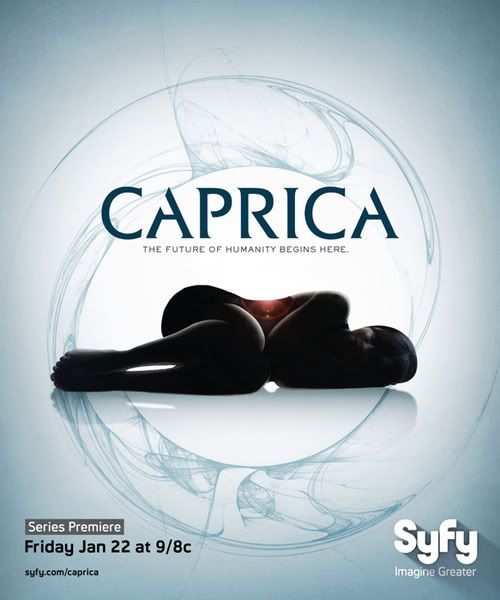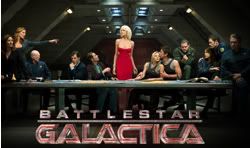Saturday, June 13, 2009
Cyborgs on the Horizon: A Reportback from the 92nd Street Y
Cyborgs on the Horizon: And finally, an audience member asked Mary if she was surprised to find out she wasn't a cylon. She said she wasn't. "It could have been an interesting cruel joke, seeing as how I'd killed so many... But I was pretty sure that Laura Roslin had to remain on the human, fearful plane - her karma was about completion of some kind of responsibility, a very blood-and-guts, cancer-ridden experience, and I just couldn't imagine that they'd want to throw all of that out."
A Sitrep Reportback
Friday night, I crowded into the 92nd Street Y with hundreds of other BSG fans for the World Science Festival event "Battlestar Galactica: Cyborgs on the Horizon." In the lead-up to the event I had conducted interviews with panel participants Hod Lipson , Kevin Warwick , and Mary McDonnell, so I was prepared for a lot of the topics of discussions... and it was still shocking and eye-opening and exciting to be so close to these marvelous people and hear about the work that they're doing, and their perspectives on these issues.
Please see below for a list of a bunch of my favorite moments. I know there were other Sitrep readers in attendance, so I hope people will post their additional favorite moments in the Comments field! All photos used in this post are © Dawn Garizzo for World Science Festival. For a full slideshow of official photographs, click here.
Event highlights included:
Nick Bostrom saying that the definition of human-level artificial intelligence is "sort of a moving target," and that "we keep moving the goalposts." "Many things that were once considered paradigmatically human, and evidence of our superior intelligence - like playing chess - we stopped considering them signs of intelligence once a computer could master them."
Michael Hogan saying that "During the miniseries, I said to myself a number of times 'man, am I glad I'm not playing a cylon!'"
Mary McDonnell saying "NOBODY gets a bigger trailer than Eddie."
Kevin Warwick telling us about a robot brain that he built out of rat brain cells, and how he hooked it up to a machine and it was able to control it, and ultimately learn not to bump into walls, and as it learned they could observe the growth of pathways among the brain cells, which is how learning happens in human brains.
Michael Hogan saying that the research for Saul Tigh was a lot of fun because it just involved "drinking a lot, which I'm good at," and Mary McDonnell saying "He really is."
Mary McDonnell saying of the episode "Epiphanies" (in which fetal stem cells from Hera save Roslin's life): "part of the reason for writing it was to address the resistance to stem cell research in this country."
Michael Hogan saying that he initially "vehemently disagreed with the idea that Tigh would go down to live on New Caprica at the end of Season Two," but "look at the arc they wrote for me in Season Three as a result - I am so proud of the work that we did, and so honored."
Hod Lipson showing a scary video of a robot that he built, teaching itself to walk, and my friend Manny turning to me and saying "this is the beginning of the end."
Mary's shock and excitement mirroring our own as we all learned about the work that Prof's Lipson and Warwick are doing.
Kevin Warwick scoffing at the idea that we would be able to control robots once they achieve super-intelligence: "Do we really think they're going to say 'I'm more intelligent than you, but I'm going to do what you tell me to do?' I mean, how stupid are humans?" And that "People tend to say 'oh, we can just switch it off if it gets too scary...' but think of the internet. It's just not possible to switch off the internet."
Mary saying that Ron Moore was "wise enough to realize that there was a co-creative aspect to the show, in his interactions with the fans. A lot of these hearts and minds (here she gestured to the audience) were very engaged in the direction the show took."
Nick Bostrom saying that once we had developed truly sentient robots, we would have to extend human rights to them, because "It ultimately doesn't matter if you're a carbon-based intelligence or a silicon-based intelligence. It makes no more difference than the color of your skin."
Kevin Warwick telling about his experience becoming a cyborg - a chip was implanted into his nervous system in his arm, and then hooked up to the internet, and he was able to control a robot hand on an entirely different continent. "I could feel that I was gripping something." "Your brain can adapt to perceive new stimuli. If we want new senses, we've got the technology to do it."
When asked what BSG taught her about being human, Mary said "If we can begin to think our way into a place that's more creative and less fearful, so many of these things we want to do can be done. I no longer suffer from the illusion that we have a lot of time. On a spiritual and political plane, I'd like to be of better and more efficient service, because it really feels like we're running out of time." And we all got chills.
When asked whether AI should be regulated by the government, Hod Lipson said it should be "something open, and not regulated, but the discussion cannot just be scientists publishing jargony articles in scientific journals no one reads - it needs to be an open discussion among everyone. This can't be something that only scientists - or anyone - has control over."
But when asked the same question, Kevin Warwick said that "The goal in military circles is 'no bodybags by 2020.' I'm personally scared by that scenario. We're developing these machines that are programmed to destroy something, usually something human, and I do feel that with that kind of destructive potential the people - whether or not it's through their governments - should have some say in how it's developed."
Subscribe to:
Post Comments (Atom)






1 comment:
thank you for the article.
Post a Comment